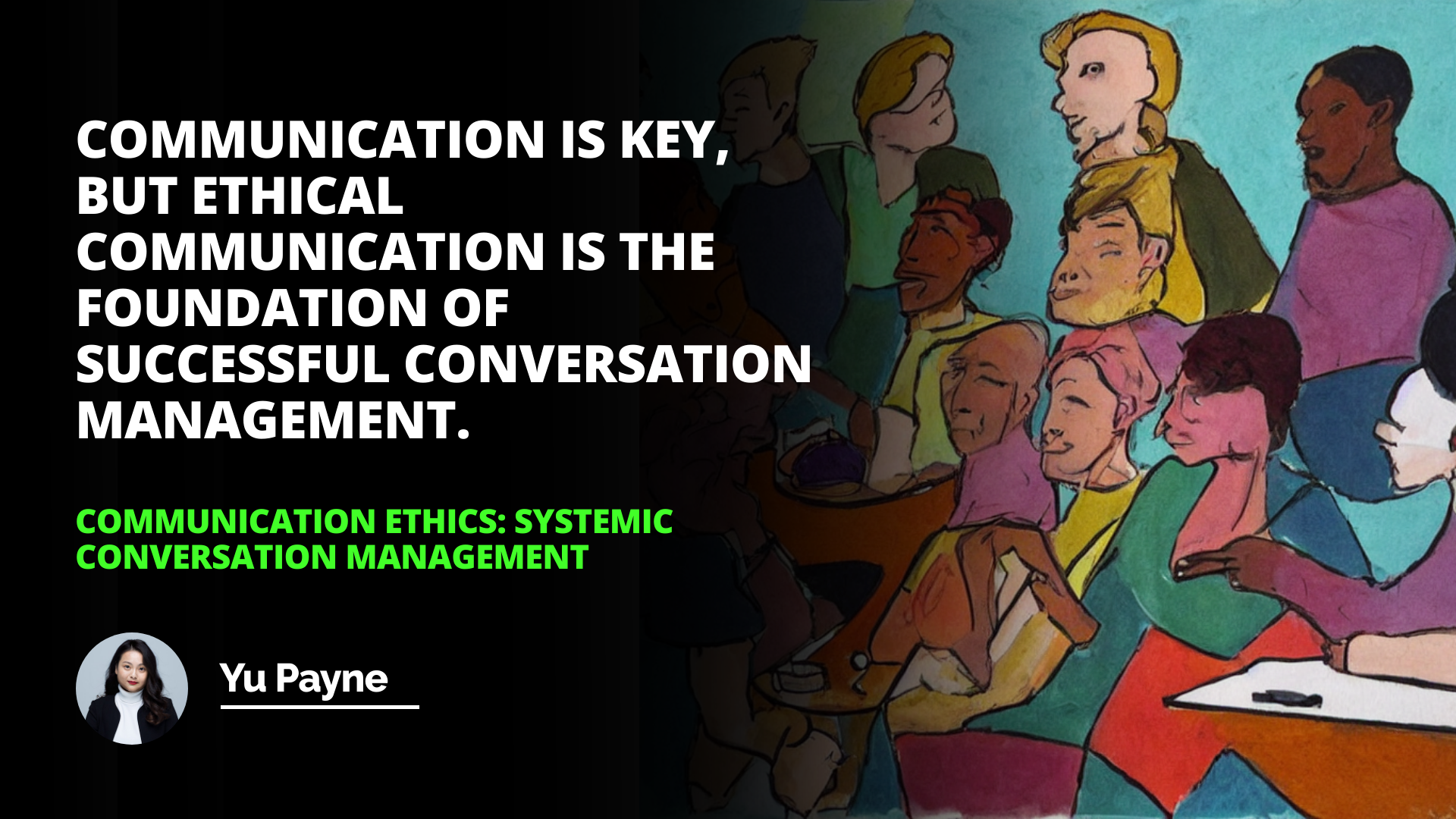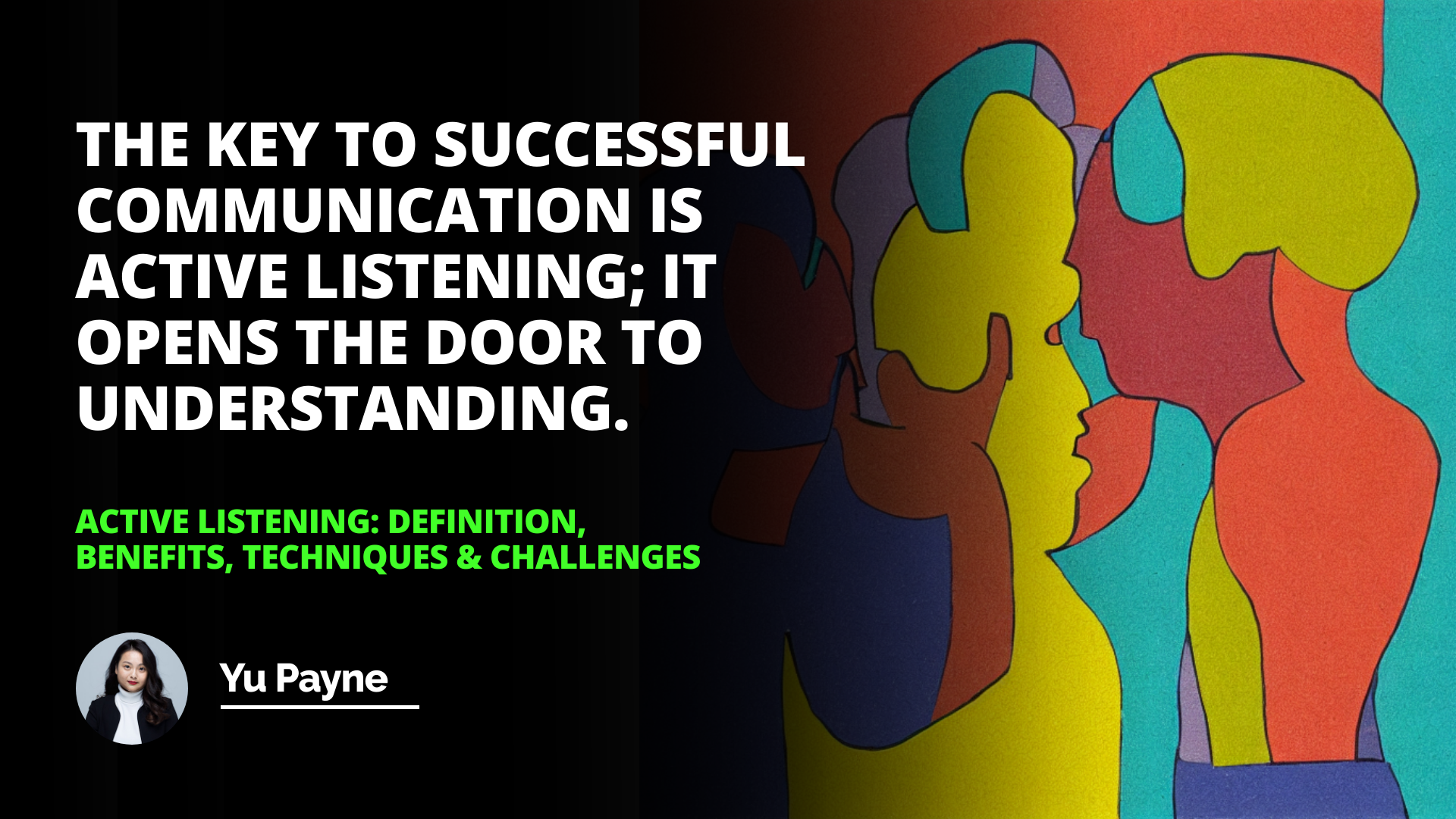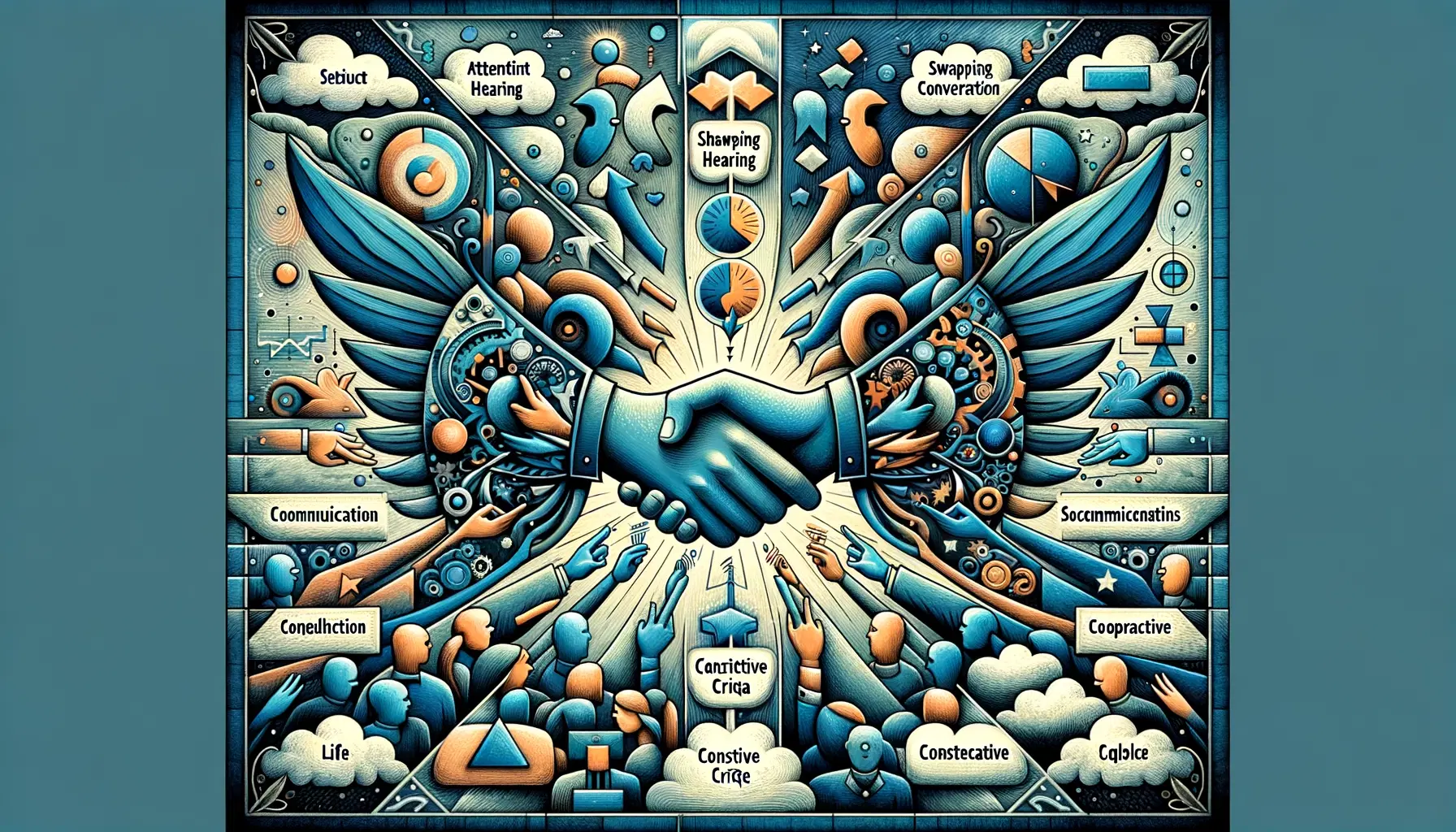
Conversations are the building blocks of human interactions. In every walk of life, be it a personal, professional, or academic setting, we engage in conversations with our peers, friends, or colleagues. Systemic conversation management is a complex process by which individuals participate in a conversation, adhering to the norms, principles, and mores of a culture or society. The complexities of discourse become evident in diverse contexts, such as intercultural communication, virtual environments, and organizations with distinctive communication cultures.
Managing conversations in such diverse contexts often pose significant challenges. Consequently, it is crucial for individuals engaging in such exchanges to develop a comprehensive understanding of systemic conversation management. This understanding allows them to navigate through complex, multi-layered discourses without offending or alienating their interlocutors. Moreover, it enables them to construct and present their ideas effectively, ensuring a smooth, interactive, and purposeful conversation.
In this article, we will explore systemic conversation management – its significance, the rules governing it, and the challenges posed by diverse contexts. We will also analyze real-life case studies where organizations have effectively navigated through the intricate web of discourse dynamics to achieve successful outcomes.
Related Course: Systemic conversation management
Case One: Intercultural Communication in Multinational Corporation
One of the most prominent challenges in navigating the complexities of discourse arises in the domain of intercultural communication. This challenge is evident in the case of Nissan, the multinational corporation, and its strategic alliance with Renault in 1999. The alliance aimed at reinvigorating Nissan's financial position and global reach by leveraging Renault's resources and expertise. The formation of this alliance led to numerous issues regarding the profound cultural differences between the Japanese and French business environments.
One such issue pertained to the management of conversations in the context of decision-making processes. The Japanese culture favored a bottom-up approach, whereby decisions made at consensus-building meetings (Nemawashi) were conveyed and ratified by the top management during official meetings (Ringi). Compounding this difficulty was the French preference for a top-down, hierarchical approach wherein the top management steered decision-making processes and provided directives.
These differences in conversation management led to misunderstandings, misinterpretations, and conflicts between the two sides. The management at Nissan and Renault recognized these communication issues and took proactive steps to bridge the cultural divide. They established a bi-cultural management team comprising of Japanese and French nationals, who worked together to facilitate effective communication and mutual understanding. This team recognized the importance of creating an environment wherein the participating management from both sides understood the nuances of each other's conversation management styles and made an effort to integrate them in their interactions.
The bi-cultural team actively promoted knowledge-sharing, cultural sensitivity training, and an appreciation for diversity. These efforts led to a gradual decline in communication-related misunderstandings and allowed for a seamless dialogue between the two sides, ultimately contributing to the alliance's success. Today, the Renault-Nissan alliance is one of the leading examples of successful intercultural communication in a multinational corporate setting, highlighting the importance of systemic conversation management in diverse contexts.
Case Two: Managing Discourse within Diverse Virtual Teams
The increasing adoption of remote work and geographically dispersed teams has led to an increase in the complexities of managing conversations within virtual environments. Virtual work settings often suffer from communication breakdowns and misunderstandings, often due to the absence of non-verbal cues and the constraints of communication technologies. This challenge becomes more daunting when virtual teams comprise of individuals from diverse cultural and linguistic backgrounds.
The case of TCS (Tata Consultancy Services), a global information technology firm, illustrates how a comprehensive understanding of systemic conversation management can contribute to effective collaboration in virtual teams. TCS's vast network of nearly 150,000 employees across the world often collaborate on complex projects using remote communication tools such as emails, video conferences, and collaborative software.
To address potential communication issues, the management at TCS developed several strategies aimed at helping team members navigate the complexities of discourse in virtual environments. TCS invested heavily in training employees to adopt a patient and empathetic attitude towards communication. This training included elements such as active listening and careful choice of words and tone, ensuring a respectful and open work environment. TCS also developed a comprehensive communication guide that outlined protocols and etiquette to be followed while collaborating across different time zones, cultures, and linguistic barriers.
Another crucial aspect of TCS's approach to conversation management involved cultivating an inclusive, trust-based, and supportive virtual work culture. The creation of safe spaces for virtual team members to discuss issues openly and honestly, without fear of retribution or misunderstanding, played a pivotal role in fostering constructive and effective conversations. The success of TCS's approach can be seen in the company's consistent growth in the international market and its reputation as a reliable provider of information technology services worldwide.
These two cases demonstrate the importance of a comprehensive approach to systemic conversation management in diverse contexts. The ability to understand the nuances and complexities of discourse and tailor the communication styles accordingly is pivotal in enabling productive interactions – whether it is in intercultural, virtual, or organizational settings. The key takeaway lies in developing a thorough grasp of the complexities of discourse, learning from contextual challenges, and applying this knowledge to enhance the quality, effectiveness, and purposefulness of conversations.
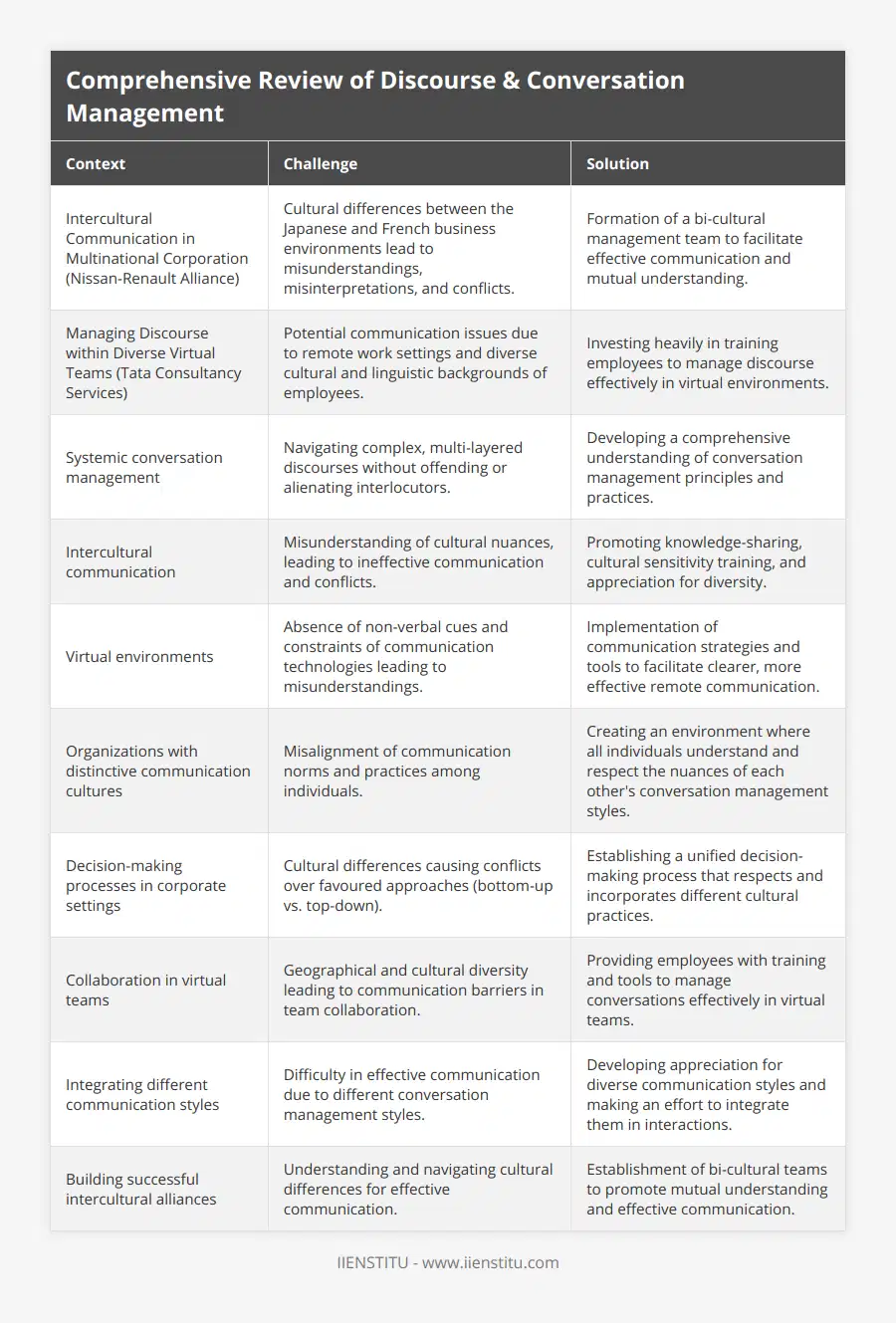
Frequently Asked Questions
What are the primary challenges in managing systemic conversations in diverse settings?
Understanding Systemic Conversations
Systemic conversations involve complex interactions. They occur in settings where diverse stakeholders engage. These discussions reflect organizational or societal systems. They often relate to change or problem-solving.
Challenges in Managing Systemic Conversations
Cultural Differences
Cultural backgrounds shape communication styles. They influence perceptions and responses. This diversity spawns misunderstandings. A key challenge here is bridging cultural gaps.
Language Barriers
Language proficiency varies. Non-native speakers might struggle. Misinterpretations become likely. Clear, simple language use is essential. It fosters inclusivity and understanding.
Power Dynamics
Hierarchies impact dialogues. Authority can stifle voices. Ensuring equitable participation is difficult. Leaders must encourage openness and share power.
Emotional Reactions
Conversations can trigger emotions. Emotions color interpretations. They might derail discussions. Neutral facilitation is necessary. It helps maintain focus and objectivity.
Complexity of Issues
Systemic issues are multi-layered. They demand nuanced understanding. Simplification risks oversimplification. Stakeholders need comprehensive grasps of issues. It aids in finding common ground.
Stakeholder Priorities
Interests often diverge. Aligning them poses problems. Varying priorities lead to conflict. Compromise becomes critical. It drives collective solutions.
Information Overload
Participants may feel overwhelmed. Too much information impedes comprehension. Critical points get lost. Prioritizing information is vital. It promotes clarity and retention.
Ensuring Inclusion
Diverse settings imply differing abilities. Ensuring accessibility challenges managers. Accommodations must align with needs. They ensure meaningful participation.
Consensus-Building
Reaching agreement is tough. Many voices demand consideration. A consensus satisfies all parties. Facilitation focuses on collaborative decision-making.
Strategies for Management
Foster Open Communication: Invite and validate all inputs.
Cultivate Empathy: Encourage understanding among participants.
Promote Active Listening: Stress the importance of hearing others.
Adapt Facilitation Techniques: Utilize strategies resonating with the group.
Provide Clear Context: Contextualize information for better understanding.
Utilize Visual Aids: Support conversations with visual resources.
Encourage Reflective Practice: Reflect on discussions to deepen insight.
Managing systemic conversations in diverse settings demands skill. It requires understanding and sensitivity. Cultivating a collaborative environment is the end goal. It ensures emerged solutions are inclusive and sustainable.
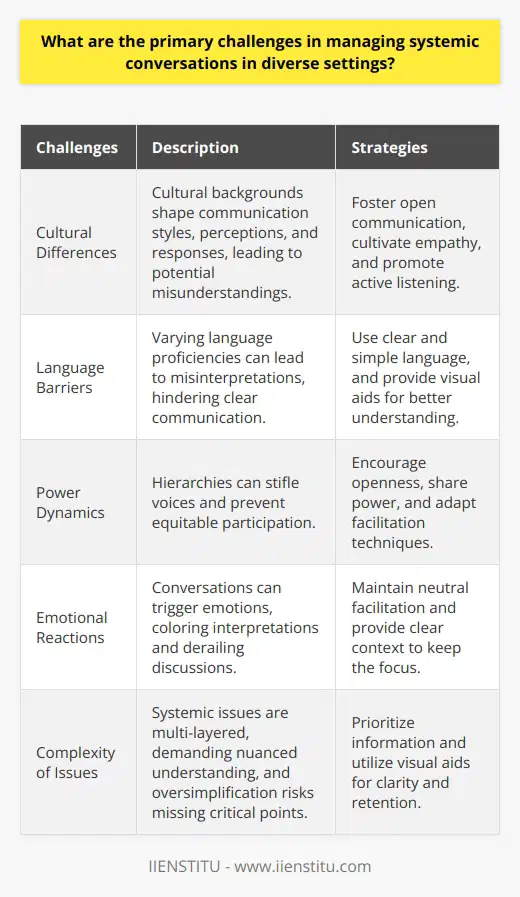
How do cultural factors influence the complexities of discourse in a systemic conversation?
Understanding Cultural Factors in Discourse
Cultural factors deeply influence discourse. Communication is more than just words. It embodies a wide range of shared beliefs, practices, and norms. These shape discourse within a systemic conversation.
Definitions Matter
Firstly, what is systemic conversation? It refers to dialogue entrenched in a system, such as societal or organizational frameworks. Here, participants often carry their cultural backgrounds into the conversation.
Culture guides expectation. We expect others to conform to our communication norms. This expectation varies widely across cultures.
Norms and Context
Culture impacts how we understand context. High-context cultures rely on implicit communication. Low-context cultures prefer explicit information. This difference can create misunderstandings in conversation.
Power Distance
Power distance plays a crucial role. It reflects how a culture handles inequality. Higher power distance means accepting unequal power distribution. This belief shapes how individuals engage in discourse.
- High power distance cultures may inhibit open exchange.
- Low power distance cultures may encourage egalitarian dialogue.
Indirect Versus Direct
Communication styles also vary. Indirect communication often features in Asian cultures. This approach avoids confrontation. Direct communication, typical in Western cultures, values clarity and succinctness.
Emotion in Discourse
Emotion's role in discourse varies culturally. Some cultures value emotional expressiveness. Others prefer maintaining emotional neutrality.
Collectivism versus Individualism
Collectivism stresses group harmony. It influences discourse towards group consensus. Individualism upholds personal opinions. This can lead to assertive, individualized conversation.
Uncertainty Avoidance
Cultures differ in their tolerance for ambiguity. High uncertainty avoidance seeks clear rules and structured discourse. Low uncertainty avoidance cultures are more comfortable with fluidity in dialogue.
Time Orientation
Time orientation affects discourse. Monochronic cultures focus on one task at a time. This leads to linear, orderly conversation. Polychronic cultures handle multiple conversations. This results in a more fluid discourse structure.
Conclusion
Cultural factors set the stage for complex discourse. They shape our expectations, norms, and conversational style. Effective communicators must understand these cultural nuances to foster healthy systemic conversations.

What strategies or methodologies can be employed to effectively navigate the complexities of discourse in diverse contexts?
Understanding Context
Effective discourse requires context understanding. Context shapes language meaning and appropriate responses.
Adapt Language Use
Adaptability enhances communication. Adjust your vocabulary, pacing, and complexity to match the audience.
Active Listening
Active listening underpins successful discourse. Pay attention, show interest, and provide feedback.
Seek Clarification
Don't assume understanding. Ask questions to clarify ambiguous points.
Cultural Sensitivity
Cultural diversity demands sensitivity. Acknowledge cultural differences and show respect in discourse.
Embrace Diversity
Value diverse perspectives. They enrich the conversation and widen understanding.
Empathy
Empathy builds connections. Understand others' feelings and viewpoints to establish rapport.
Use Inclusive Language
Inclusive language avoids alienation. It fosters a sense of belonging and respect.
Clarity and Brevity
Clarity and brevity aid understanding. Keep sentences short and straightforward.
Avoid Jargon
Limit technical language. It often confuses audiences outside your field.
Analyze Your Audience
Know your audience. Tailor your message to their values, beliefs, and understanding.
Adjust Your Message
Align your message with the audience's interests and knowledge level.
Feedback Loops
Feedback ensures message reception. Seek and provide feedback for iterative improvements.
Reflect and Respond
Consider the feedback received. Respond thoughtfully to ensure mutual understanding.
Continual Learning
Stay curious and informed. Understand discourse complexities through ongoing learning.
Cross-disciplinary Knowledge
Broaden your knowledge base. It helps navigate discourse spanning multiple fields.
Conflict Resolution Strategies
Conflict is inevitable. Manage it with strategies that promote understanding and consensus.
Use Mediation Techniques
Mediation reconciles differing viewpoints. Use these techniques to navigate through disagreements.
Conclusion
Diverse contexts require strategic discourse navigation. Understand context, adapt language, listen actively, and embrace cultural diversity. Empathize, be clear, analyze your audience, maintain feedback loops, and commit to continual learning. These strategies ensure effective communication across varied discourse landscapes.


